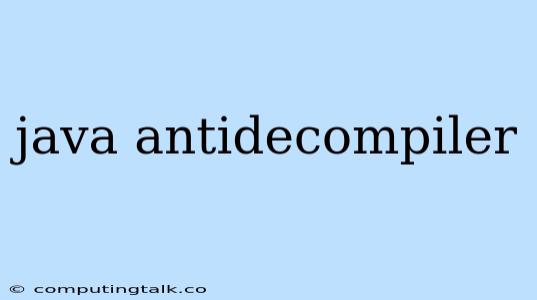Java is a widely used programming language, known for its portability and platform independence. This versatility also makes Java code susceptible to reverse engineering, where malicious actors can decompile your code and access your intellectual property. To counter this threat, developers employ anti-decompiler techniques to protect their Java code from unauthorized access and analysis.
What is Decompilation?
Decompilation is the process of converting compiled code back into a human-readable form, typically the original source code. Decompilers use algorithms to analyze the compiled bytecode and reconstruct the original source code, often with varying degrees of accuracy and completeness.
Why is Decompilation a Threat?
Decompilation poses a significant threat to Java developers for several reasons:
- Intellectual Property Theft: Decompiled code can reveal your proprietary algorithms, business logic, and other sensitive information, potentially compromising your competitive advantage.
- Malware and Security Risks: Decompiled code can be modified and re-compiled to introduce malicious code or vulnerabilities, creating security risks for your applications.
- Copyright Infringement: Decompilation can violate copyright laws by allowing unauthorized use and distribution of your code.
How to Protect Your Java Code from Decompilation
Here are some techniques to hinder decompilation and enhance the security of your Java code:
1. Obfuscation
Obfuscation is a widely used technique to make your Java code harder to understand and decompile. It involves renaming classes, methods, variables, and constants to meaningless names, making it difficult for decompilers to reconstruct the original source code.
- Code Renaming: Renaming classes, methods, and variables using random or obfuscated names.
- String Encryption: Encrypting sensitive strings to make them incomprehensible to decompilers.
- Control Flow Obfuscation: Adding redundant or confusing code to the control flow, making it harder to follow the execution path.
2. Code Encryption
Code encryption involves encrypting the compiled bytecode to prevent decompilers from accessing the underlying code. This approach requires decryption at runtime, adding overhead but providing stronger protection.
- Custom Encryptors: Develop your own encryption algorithms to encrypt bytecode.
- Third-Party Libraries: Utilize existing encryption libraries to encrypt bytecode.
3. Runtime Protection
Runtime protection involves adding code to your application that detects and prevents unauthorized access to your code. This approach can include techniques like:
- Anti-Tampering Mechanisms: Detect modifications to your application and prevent execution.
- Dynamic Code Loading: Load code dynamically at runtime to make it harder to decompile.
4. Java Class File Encryption
This method involves encrypting the class files directly. The encrypted class files are then decrypted at runtime before they can be executed by the JVM. This approach requires a custom class loader to handle decryption and execution.
5. Code Signing
Code signing adds a digital signature to your Java code, verifying its origin and ensuring authenticity. Although code signing does not directly prevent decompilation, it can help you identify whether the code has been tampered with.
Choosing the Right Anti-Decompiler Strategy
The best anti-decompiler strategy depends on your specific needs and the level of protection required. Consider the following factors:
- Sensitivity of your code: For highly sensitive applications, consider multiple layers of protection.
- Performance impact: Some techniques, like code encryption, can impact application performance.
- Cost and resources: Evaluate the cost of implementing and maintaining your anti-decompiler strategy.
Limitations of Anti-Decompiler Techniques
While anti-decompiler techniques can significantly hinder decompilation efforts, they are not foolproof. Determined attackers may still be able to decompile your code, albeit with greater difficulty.
- Decompilers are constantly evolving: New decompilers are being developed to overcome existing anti-decompiler techniques.
- Complexity and time investment: Implementing robust anti-decompilation measures can require significant time and resources.
Conclusion
Protecting your Java code from decompilation is crucial for safeguarding your intellectual property and ensuring the security of your applications. By combining various anti-decompiler techniques, you can create a significant barrier to unauthorized access and analysis. Remember, no protection is foolproof, but by implementing robust security measures, you can significantly reduce the risk of decompilation and its potential consequences.
